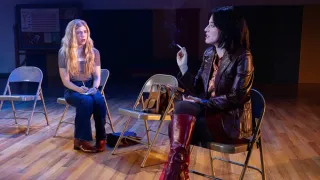December 18, 2024
EDGE Interview: Liberty Styles on Liberating Tap in ART's 'Diary of a Tap Dancer'
Kilian Melloy READ TIME: 8 MIN.
The world premiere of Ayodele Casel and Torya Beard's new work, "Diary of a Tap Dancer," is enjoying a run right now at the American Repertory Theater in Harvard Square. It runs through January 4 at the Loeb Drama Center. For more information, follow this link.
A much-needed corrective of how the contributions of women of color in tap dance have been glossed over, the show is also a look at Casel's own career, recounting her "life from her roots in The Bronx and Puerto Rico while celebrating the extraordinary and often-overlooked women tap dancers who paved the way."
The "electric new play weaves together dance, narrative, and song to reveal the power of reclaiming language, culture, and one's own identity," a release from the A.R.T. says,
There's more to the topic than a single work of theater can address, but the A.R.T. is enhancing the experience with a partnership with the nearby Brattle Theatre that allows patrons to enjoy a "Tap in Film" series of Friday matinee screenings. Also, a special post-show conversation, "Legacy of Women in Tap," slated for Dec. 21, will let the audience engage with tap icon Diane Walker, performer Naomi Funaki, and Ayodele Casel as they "share their relationships with the art form, journeys as tap dancers, and the legacies they hope to carry forward with A.R.T. Advisor Priscilla H. Douglas" (per the A.R.T.'s website).
The A.R.T. cautions the show "contains racial slurs, discusses domestic violence and drug use, and includes historical references to enslaved and oppressed people. It also contains haze and flashing lights." It is "recommended for ages 13+."
Dancer Liberty Styles, who identifies as genderfluid and uses she/they pronouns, chatted with EDGE about the show – and her own journey – in a recent phone conversation.






